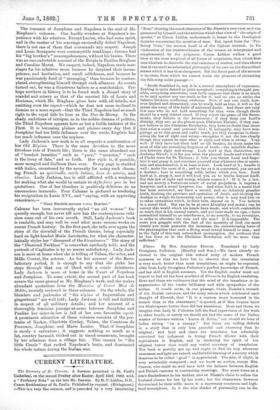CURRENT LITERATURE.
The Recovery of St. Thomas. A Sermon preached in St. Paul's
"Note" showing the exact character of Mr. Darwin's own view, as it was presented by himself, and the relation which that view of " the origin of species," as Canon Liddon understands it, bears to the theological doctrine concerning the creation of man. But, apart from the "Pre- fatory Note," the sermon itself is of the highest interest. In his vindication of the trustworthiness of the senses, as interpreted and supplemented by the judgment, Canon Liddon strikes a good blow at the most sceptical of all forms of scepticism, that which first uses idealism to discredit the real existence of matter, and then shows that it can erect no substantial philosophy of its own on the discredited senses which it has thus cheapened. But the finest part of the sermon is its close, from which we cannot resist the pleasure of extracting the following noble passage :-
" Doubt flourishes in, nay it is, a mental atmosphere of vagueness. Nothing is quite denied or quite accepted ; everything is thought pos- sible, everything uncertain; men lazily suppose that there is as much to be said against any one truth as for it, and no one to strike the balance between conflicting evidence. Now, if any one truth, how- ever limited and elementary, can be really held as true, it will so far arrest the sway of this habit of universal doubt. And there are very few men who do not hold something for true, even though theirs should be a very stinted creed. If they reject the grace of the Sacra- ments, they believe in the Atonement ; if they deny our Lord's divinity, they are, as the phrase goes, Christian Theists ; if they can- not believe in the Christian Revelation, they have no doubt that there does exist a moral and personal God ; if, unhappily, they have mis- givings as to this great and awful truth, yet they recognise in them- selves the law of right and wrong—recognise it not the less clearly though they cannot be sure what is right and what is wrong. Very well : if they have lost their hold on all besides, let them make the most of this one remaining fragment of truth,—the indelible distinc- tion between right and wrong. Look hard at that distinction, my doubting friend ; it is for you what the pierced hands and riven side of Christ were for St. Thomas ; it bids you thrust hand and finger into it and grasp it, and convince yourself that whatever else is uncer- tain and unsubstantial, it at least is real. Look hard at it ; handle it. well ; make the most of it ; and so far as it is concerned, you are not a doubter ; here is something solid, before which you bow. Look hard at it, grasp it, and it will lead you on to truths beyond itself. For this law of right and wrong, whence comes it ? If it be a law, and not merely a fortuitous result of social prejudices, it implies a lawgiver, and a moral lawgiver, too. And when faith in a moral God has been recovered, we have a second, and an infinitely grander truth, limiting the province and operation of doubt, and inviting the doubter to weigh its immensity and power, that it may lead him on to other certainties which, in their turn, depend on it. You believe in a moral God. But can he be at once Almighty and moral; can he survey this world which his hands have made, and which contradicts so much that is his eternal nature, and yet have made no sign,—have committed himself to no interference, to no remedy, to no revelation, in order to alleviate the ruin and the woe ? It is impossible. The more you grapple with the fact of the morality of God, the more clearly you must perceive the immense, the overwhelming force of the presumption that such a Being must reveal himself to man ; and in the light of this vast antecedent presumption, the evidence that he has done so in the Christian Revelation will be more than sufficient."














































 Previous page
Previous page